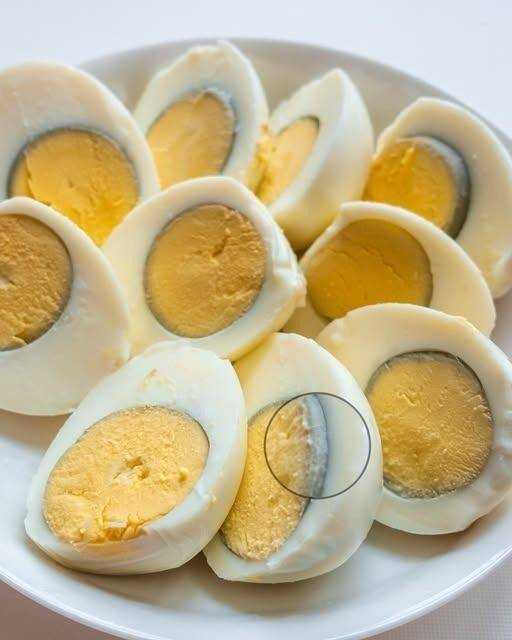ADVERTISEMENT
Why Does the Green Ring Appear?
The green ring forms because the sulfur and iron react more intensely at higher temperatures or with prolonged cooking times. If you cook your eggs too long, the heat forces these compounds to interact and form the unappealing green ring. Typically, this happens when eggs are boiled for around 10-12 minutes or longer. Eggs cooked at higher temperatures, like being simmered on a rapid boil, are also more likely to develop this ring.
Is the Green Ring Harmful?
The green ring might not look appetizing, but it’s completely safe to eat. It’s simply the result of a natural chemical reaction, and it doesn’t change the nutritional value or the taste of the egg. The green color is a harmless byproduct of the egg’s proteins interacting with heat over time.
However, if you find the green ring unappealing, there are a few tips to help you avoid it in the future.
How to Prevent the Green Ring from Forming
- Don’t Overcook the Eggs
The most effective way to prevent the green ring is by cooking your eggs properly. The key is to avoid overcooking. You can achieve perfect hard-boiled eggs by following these steps:
- Place eggs in a pot and cover them with cold water (about an inch or so above the eggs).
- Slowly bring the water to a boil over medium heat.
- Once the water starts to boil, cover the pot with a lid and remove it from the heat. Let the eggs sit in the hot water for about 9-12 minutes. For softer yolks, aim for around 9 minutes, and for fully set yolks, go for closer to 12 minutes.
- After the eggs have sat in the hot water, immediately transfer them to an ice bath or run them under cold water for several minutes. This helps stop the cooking process and makes them easier to peel.
- Cool the Eggs Quickly
After the eggs are done cooking, cool them quickly to stop the cooking process. An ice bath or placing them under cold running water for several minutes will help preserve the perfect consistency of the yolk and prevent any further reactions between sulfur and iron. - Lower the Cooking Temperature
Instead of boiling your eggs at a rolling boil, you can simmer them gently over low to medium heat. Simmering helps prevent the egg whites from becoming too tough and helps maintain a creamy yolk while reducing the risk of a green ring. - Don’t Cook Eggs for Too Long
As mentioned earlier, avoid cooking eggs for longer than 12 minutes. The longer you cook an egg, the higher the chances of sulfur and iron reacting to form the green ring. Stick to a consistent cooking time and remove the eggs from the heat promptly. - Consider Using Older Eggs
Fresh eggs are more prone to developing the green ring because they contain more acidic components in the white. Using slightly older eggs may reduce the likelihood of a green ring, though it’s not a guaranteed solution.
Final Thoughts
The green ring around your hard-boiled egg is caused by a natural chemical reaction between sulfur and iron, often resulting from overcooking. While it’s harmless, it’s certainly not the most appetizing visual. By following the right cooking method—don’t overcook, simmer gently, and cool quickly—you can avoid the green ring and enjoy beautiful, perfectly cooked hard-boiled eggs every time.
Next time you’re in the kitchen, you can rest easy knowing that the green ring is just a small consequence of a chemical reaction, and you can easily prevent it with a few simple adjustments to your cooking process. Happy boiling!
ADVERTISEMENT
